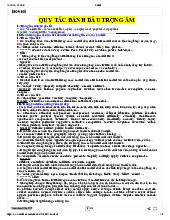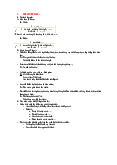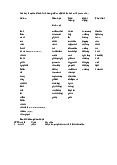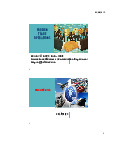







Preview text:
16:36 9/8/24
Types of Sentences - Summary Basic English 23/12/2023 Types of sentences Simple Sentence Compound sentence Complex sentence
Compound-complex sentence Simple Sentence 1. Compound Subject
The telegraph and the electric doorbell work on similar principle.
The sun, the moon, and the stars gave ancient man a lot of things to think. 1 about:blank 1/8 16:36 9/8/24
Types of Sentences - Summary Basic English 23/12/2023 Simple Sentence 2. Compound Verb
• They came and stayed.
• The audience cheered and applauded the play. Simple Sentence
3. Compound Direct Object
• We bought newspapers and magazines.
• She needs flour, sugar, and eggs. 2 about:blank 2/8 16:36 9/8/24
Types of Sentences - Summary Basic English 23/12/2023 Simple Sentence
4. Compound Indirect Object
• She told the boys and the girls funny stories.
• I gave Steve and David tickets. Simple Sentence
5. Compound Object of Preposition
• They drove through the heavy rain and fog.
• We talked about our careers and our hopes. 3 about:blank 3/8 16:36 9/8/24
Types of Sentences - Summary Basic English 23/12/2023 Simple Sentence
6. Compound Subject Complement
• That car looks old but dependable. Simple Sentence 7. Compound Predicate
• Mary turned off the radio and began her homework.
• Heavy rains flooded the streets and damaged many homes. 4 about:blank 4/8 16:36 9/8/24
Types of Sentences - Summary Basic English 23/12/2023 Simple Sentence
8. Compound Subject and Compound Predicate
• The boys and the girls washed the dishes and dried them.
• Tom and David fished all day and caught nothing. Compound Sentence
Two simple sentences combine with a ‘comma’ and one
conjunction (for, and, nor, but, or, yet,so), or a semicolon.
The flowers were beautiful, but she did not buy them.
Kevin knew Dalat well, for he had lived there.
You can take five hours by car, or you can get there in an hour by plane. 5 about:blank 5/8 16:36 9/8/24
Types of Sentences - Summary Basic English 23/12/2023 Compound Sentence
Jeeps are light, so they run very fast.
Jeff could not do the tango, nor could he do the cha-cha-cha.
The bank failed; Mr Richard disappeared.
Mary did the dishes; Betty dried them. Complex sentence
Conjunctions (then, however, moreover, hence,
consequently, therefore, etc.) can combine two simple
sentences to form a complex sentence.
1. His advice was not taken; consequently, he was angry.
2. Read the direction carefully; then, begin the examination. 6 about:blank 6/8 16:36 9/8/24
Types of Sentences - Summary Basic English 23/12/2023 Complex sentence
A complex sentence includes a dependent clause and an
independent clause. A dependent clause is always introduced by
a subordinator / subordinating conjunction.
If the emergency continues, water will be rationed.
This is the kind of music that I really like. Complex sentence
• Complex sentences can include a noun clause it is considered as a
noun in the main clause subject, object, or modifier in the main clause.
1. What you read influences your thinking. Subject
2. The teachers felt responsible for what their students did. Object 7 about:blank 7/8 16:36 9/8/24
Types of Sentences - Summary Basic English 23/12/2023
Compound-complex sentence
• Compound-complex sentences include two or many main clauses and one or many subordinate clauses.
• Can be combined by a coordinating conjunction, conjunctive adverb, or a semicolon (;)
• Subordinate clauses can modify a word in main clauses or can used as a noun in main clause. 1. I will come, and I will bring a friend if he has a day off. main clause main clause subordinate clause 2. I ran back to school, and there I found the key that I lost. Main clause main clause subordinate clause 8 about:blank 8/8




